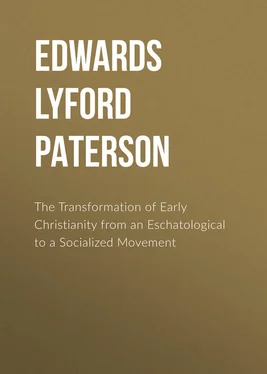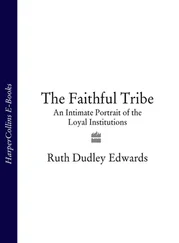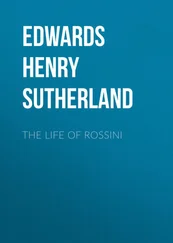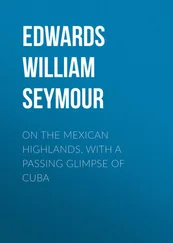However it is probably that the transfer of the psychological values from Chiliasm was more to be ascribed to the rising asceticism of the early Church than to the concept of the Church as such, or even to the rise of the purgatory concept. Asceticism in some form is a permanent element in any wide spread religion and the values later expressed in Christian asceticism were in the earlier period mediated through Chiliasm. When St. Paul advocated abstinence from marriage 'because the time is short' he was not expressing asceticism. He was expressing a sensible idea based on belief in one of the chief Chiliastic doctrines, the immediate imminence of the Second Advent. In the case of such teachers as Tertullian the doctrine of marriage is the result of a combination of Chiliasm and asceticism. At a later date asceticism took over the doctrine of celibacy as meritorious on its own account but it never outgrew the original Chiliastic view that it was a logical preparation for the Second Advent. In other words restriction in matrimony whether Chiliastic or monastic is due to the same inherent element in human nature, i.e., the masochistic. Similarly those good Phrygian Chiliasts who abandoned all their possessions and went out into the desert to meet the Lord were moved by the same psychological impulse that actuated the monks of the Thebaid. Historically the one set of concepts imperceptibly gave way to the other. Those same Thebaid monks are a good illustration of the fact. Some of them, at least in the earlier stages of the movement, were influenced more by Chiliastic concepts than by monastic ones. Many were influenced by both. Here again the superior value of the ascetic concepts for the ecclesiastical organization determined the eventual survival of the monastic institution. But whatever the conceptual images employed to give expression to the masochistic impulse, that impulse was psychologically the same. Organized monachism furnished a more convenient outlet for the stronger masochistic impulses than Chiliasm and so superseded it. The fact that monachism grew in proportion as Chiliasm declined is in this respect merely a case of trans-shipment. The vehicle was different but the goods carried were the same.
There are numerous other social and psychological, as well as economic causes for the declension of Chiliasm but they can perhaps be more conveniently considered in connection with the socialization of the early Church.
CHAPTER II
THE EARLY CHURCH AND PROPERTY CONCEPTS
The Chiliasm of the early Christians had a direct bearing upon their attitude toward the property institutions and property concepts of the time. Neither the declension of Chiliasm nor the progressive socialization of the Church can be understood without some consideration of the attitude of the Christians toward property, and conversely the effect of the existing economic system upon the Christians.
The early Church made its appearance in a world where the institution of private property was supreme in fact and very largely unquestioned in theory. It is recognized with perfect clearness by all the ancient thinkers who refer to the subject that their civilization was based upon the property rights of man in man. It is not true that slavery was invariably considered part of the unalterable law of nature. Aristotle expressly states that a sufficient development of mechanistic technology would abrogate slavery. But such a technological development was not expected nor indeed wished for. Contempt for mechanical processes of industry was universal, with the dubious exception of the application of science to military engines. There is a similar unanimity in regard to commercial enterprise. Money obtained by ordinary mercantile methods was considered as dishonestly acquired. It was assumed as self-evident that the merchant had to be a thief. Interest on money was of course reprobated as contrary to nature. 36 36 Cf. Plato, Laws, V, 742. Aristotle, Politics, 1:X, XI. Cicero, De Officus, II, XXV. Seneca, De Beneficus, VII, X.
Конец ознакомительного фрагмента.
Текст предоставлен ООО «ЛитРес».
Прочитайте эту книгу целиком, купив полную легальную версию на ЛитРес.
Безопасно оплатить книгу можно банковской картой Visa, MasterCard, Maestro, со счета мобильного телефона, с платежного терминала, в салоне МТС или Связной, через PayPal, WebMoney, Яндекс.Деньги, QIWI Кошелек, бонусными картами или другим удобным Вам способом.
F. Pollock, Essays in Jurisprudence and Ethics, p. 314.
Cf. I Enoch XCI-CIV.
Cf. Parables in I Enoch XXXVII-LXXI.
Cf. Apocalypse of Baruch; 4 Ezra, 4 Maccabees.
Irenaeus Adv. Haer. V 33. II Baruch XXIX.
Hist. of Dogma, Vol. III, p. 19.
Ens. H. E. VI 27-2.
Justin Martyn, Tertullian, Lactantius.
Ad. Celsus LXI.
Sib. Orac. VIII, 148 seq.
Hippolytus, Com. on Daniel.
Strom. VII, 17; VI 16; IV 25; V 6, 14.
De Princ, II, 11.
Cf. e.g., A. R. Wallace, The World of Life.
Eus. H. E. VII 25.
Discourse on the Resurrection, I, 9 seq. See also Conviv. IX, 1, 5.
Ep. CII, 4.
Ep. CCLXIII, 4.
Cp. CCLXV, 2.
Frag. Dan. I, 5, 6.
De Christo et Antic. 50.
Instructions, LXXX.
Schaff Hist., ii, 855. Sec. LXVII of poem.
Comm. XX 4.5.
Comm. XX 1.3.
Div. Ins. Bk. 7 XXIV.
C.D. XX 7.
I.e., the Millennium.
C.D. XX 7.
Rev. XX.
De Prin. II, 11, 3.
De Prin. II, 11, 7.
City of God in Nicene and Post Nicene Fathers, 1st Series, Vol. II, p. 427.
E.g., Lydia, Phrygia, The Thebaid.
Clem. Alex. Paed., iii, Strom. VII. Origen, Hom. on Num., XXV. Hom. on Ps. XXVI. Lactantius, VII, 20.
Cf. Plato, Laws, V, 742. Aristotle, Politics, 1:X, XI. Cicero, De Officus, II, XXV. Seneca, De Beneficus, VII, X.












